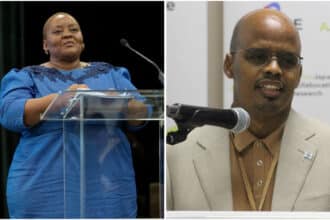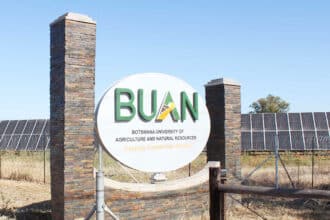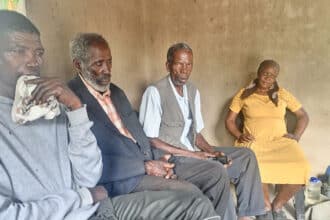Four thousand people lose jobs * SOPE triggers cancellation of postponed trips
The world Travel and Tourism group has already projected over 50 million job losses in the tourism industry worldwide and US$2,1 trillion financial losses because of Covid 19 pandemic.
In Botswana no official statistics has been released yet but the damages inflicted by the corona virus has been laid bare for all to see, especially in the tourist town of Maun.
One of the hardest hit tourism product in Ngamiland is the mobile safari business, represented by the Botswana Guides Association (BOGA)
BOGA houses 391 mobile safari businesses and 400 individual freelance professional guides and mokoro (dug-out canoe) polers.
The sectors employ a combined total number of 4000 employees. All of BOGA members fall within the small/medium enterprises category and are owned by indigenous Batswana.
The mobile safari businesses survive on walk-in business. These are self-drive, backpacker groups and individual tourists.
To date, all BOGA members have ceased operations, which means 4000 employees are without work and in most cases without earnings.

To the untrained eye BOGA may sound like a giant organisation.
Far from it! Juxtaposed with its counterparts in the tourism industry it pales in comparison in terms of resources, reach and influence.
It’s headquartered in Maun only, while its counterparts have satellites offices in Maun and other areas, with headquarters in Gaborone.
The members for these organizations are well-established tourism outfits with offices and operations worldwide.
They employ people in a myriad of countries on a full-time basis mostly. BOGA on members on the other hand are largely freelance guides and mokoro polers engaged seasonally and without contracts.
BOGA Chairperson, Kenson Kgaga is a worried man. His fears are not misplaced.
As an example he cites the dire cases of freelance guides and mokoro (dug-out canoe) polers.
Although considered employees by the mobile safari operators who utilize their services mostly during the green or pick season, they are in business terms considered temporary employees without a contract.
Kgaga is worried that they may not benefit from government’s COVID19 Relief Fund.

“These members rely solely on the business they receive from the mobile safari operators,” he said. The polers are also victims of another disaster; the drying up of the Delta last year.
Since the outbreak of the novel corona virus in Wuhan China in Decemeber 2019, the tourism sector in Botswana faced mass cancellation of bookings by their international clientele.
A global campaign termed “Be kind to Africa, don’t cancel your booking, postpone’ by African tourism outfits began to take shape in Africa.
The tide of cancellations was momentarily stemmed. Tourists began to postpone, as the virus had then not affected most African countries.
This year however, things took a turn for the worst as African country after another began to register positive cases.
In Botswana, the first such case was registered on March 28th 2020.
Thereafter things snow balled as more cases were registered, which triggered both a lockdown and eventually the president requested and was granted a six month long State of Public Emergency (SoPE)
The world was watching and the booked tourists watching even closer.
The first cancellation for a BOGA member happened the day the SoPE was passed by parliament, according to Kgaga.
SoPE, Kgaga said, triggered a chain reaction of concerted cancellations of previously postponed bookings.
“These cancellations come with a high bill to the businesses. One the start-up members (a mobile safari operator) of ours is faced with reimbursing his client an amount of P75 000,” Kgaga explained.
“This is advance payment made to him by the client to handle their lodging and camping bookings among other things. This amount registers as a negative on his balance sheet and he has had to pay his employees as well,” explained an exasperated Kgaga.
On March 27, a day before the first COVID19 case was registered in Botswana, Kgaga says the Botswana Tourism Organisation (BTO) called BOGA and other tourism associations such as HATAB to a meeting in Gaborone.
The purpose of the meeting was to appreciate their sectorial challenges and see how government could best assist them.
While he appreciates the importance of the meeting, Kgaga worries that to date, government or BTO has not formally communicated with them at BOGA pertaining how their members will be assisted.
“I have since written a letter to BTO seeking answers and I have not received any response,” he said.
Kgaga says he has heard President Masisi and other senior government officials mention a business rescue package but he worries those consultations between government and the tourism industry seems to focus on HATAB at the exclusion of BOGA.
“I have heard the president publicly say he has engaged with HATAB. He has not mentioned BOGA not even once although I have been to his office and that of the Vice President twice last year. I have had conversations with Vice President, Slumber Tsogwane over the phone so they know about us and that we represent the interest of the small operators,” said Kgaga.
Kgaga is a veteran of the tourism industry and owner of a mobile safari business. As of today, Kgaga told this publication that of their 391 members in the mobile safari sector, almost all have so far reported cancelations but that’s only the beginning, he says.
Ngamiland’s economy is anchored on the tourism sector since the fall of the cattle farming industry over ten years ago due to the almost permanent presence of the Foot and Mouth Disease (FMD).
Ngamiland is a vast territory made up of over a hundred remote villages and settlements in hard to reach terrain.
Economically it rates as either the poorest or second poorest district in Botswana yearly though it is the epicenter of tourism, Botswana’s second GDP contributor after diamonds.





